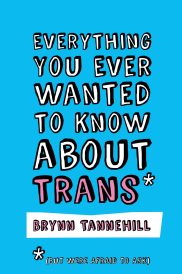

By Brynn Tannehill
Special to Lesbian.com
On November 21, Everything You Ever Wanted to Know About Trans (But Were Afraid To Ask) by Brynn Tannehill — Trans activist, writer, and former Naval Aviator — was released by Jessica Kingsley Publishers. This groundbreaking book was written to shed light on biased research and bad science and to inform both those that identify as Trans and those that do not about issues that face the Trans community. Reviewers are calling this an “essential” read that is both “passionate “and “humorous.” Below is an excerpt from the book, introducing the chapter on how the Trans community is represented by the media and popular culture.
Transgender people in the US, and elsewhere, are being included in popular culture and in the media more than they ever have been in the past. We’re in the news with the attempt at banning us from the military. TV shows such as Orange Is the New Black, Transparent, and Sense8 have featured prominent transgender characters played by transgender actors. In general, these have been portrayals that were well received by critics. Transparent features two transgender actors as recurring characters. Actress Laverne Cox won an Emmy for her work as an executive producer on MTV’s Laverne Cox Presents: The T Word. Tangerine was centered on the lives of transgender women of color, featured transgender actors in the lead roles, and received critical acclaim.
The TransMilitary documentary, directed by Fiona Dawson and Gabriel Silverman, which was first screened at South-by-Southwest in 2018, received the audience choice award for best documentary, and was named one of “The best 8 films we saw at SXSW” by Rotten Tomatoes. Top critic John DeFore at The
Hollywood Reporter described the documentary as “affecting,” and described how, “TransMilitary introduces several outstanding trans service members whose peers and superiors are totally unfazed by their situation, knowing that being able to count on someone in the field is infinitely more important than what’s in his or her pants.”
These are just a few of the positive and well-received recent media representations of transgender people playing (or being) themselves. However, when it comes to big budget movies, most still fail to cast transgender people in transgender roles, and both film and TV still frequently repeat inaccurate, outdated tropes about transgender lives.
While P.T. Barnum once said, “There’s no such thing as bad publicity,” not everyone would agree. While most people know what “transgender” means, that doesn’t mean they encounter us on a routine basis. Eighty-seven percent of Americans know someone who is lesbian or gay, but only 16 percent know a transgender person.1116 Thus media portrayals of transgender people are likely to have a disproportionate effect on how cisgender people
perceive a transgender person when they meet them.
For example, if when a transgender person goes to a job interview, and the interviewer’s only exposure to transgender people is characters who are prostitutes, serial killers, or flaming human wreckage, this probably doesn’t work in the transgender applicant’s favor.
The characters “Brie” in Transamerica and “Rayon” in Dallas Buyers Club were both played by cisgender actors. While Brie was a lead character played by a cisgender woman, and Rayon was a side-kick character played by a cisgender man, they were similar in that neither was competent in their gender presentation, both were leading disastrous lives, and neither was the sort of person you would hire for more than an entry-level job, if at all. The characters themselves are essentially human wreckage, and played alternately for laughs and for pity. This chapter examines the most pernicious ways that transgender people are harmed by media representation. This includes an examination of “the pathetic tranny,” “the transsexual serial killer,” and “the trap” tropes about transgenderpeople. It also looks at how being played as a freaks and jokes who could never be loved by “real” people takes a devastating emotional toll. Finally, it discusses how to improve representation.
Brynn Tannehill is a leading trans activist and essayist, and has written for The New York Times, The Huffington Post, Bilerico, Slate, Salon, USA Today, The Advocate, LGBTQ Nation, The New Civil Rights Movement, as a blogger and featured columnist.
A leader in Gender Diversity books, Jessica Kingsley Publishers publishes informative guides for professionals, parents, children, teens, and the general reader. For more information on this title and others, visit www. jkp.com or call 215-622-1161. To preorder, visit Amazon.com.






